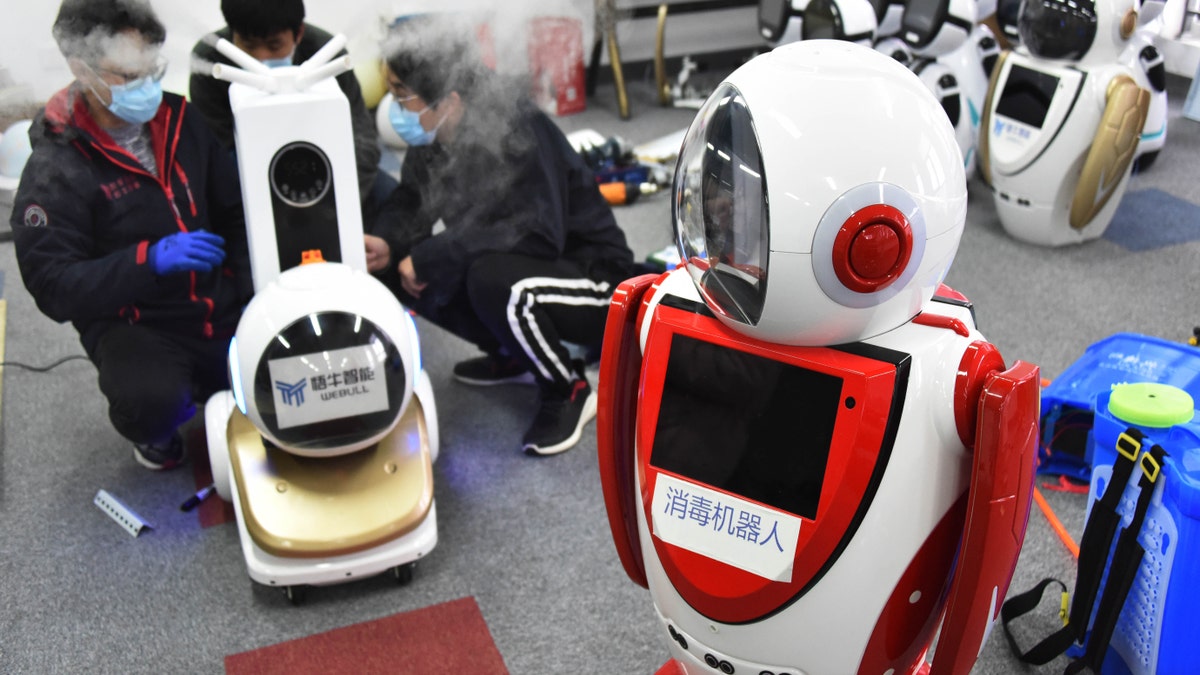China reports explosive spike in new cases of coronavirus
Chinese officials say the jump comes down to the methodology used to diagnosed new cases; Benjamin Hall reports from London.
Could robots be a vital weapon in the battle against the novel coronavirus?
The outbreak that originated in Wuhan, China, has infected more than 60,000 people worldwide and the death toll stands at more than 1,300 as of Friday. This has taxed human health care workers, doctors and nurses.
Robots have already been deployed in some Chinese hospitals to deliver medicines and disinfect surfaces, according to media reports, and they have also been used to transport supplies in Wuhan.
TRACK CORONAVIRUS’ GLOBAL SPREAD IN REAL TIME WITH THIS INTERACTIVE MAP
Colin Angle, the CEO of consumer robot specialist iRobot, told Fox News that robots are hard at work helping the infected patients and delivering medical supplies.

Technicians work on a second-generation disinfection robot in a technological company in Qingdao, east China's Shandong Province, Feb. 11, 2020. Qingdao has called on tech companies to research, develop and refit disinfection robots which can replace human in disinfection operations. Some of the robots have been put into use in the isolation areas of several hospitals. (Xinhua/Li Ziheng via Getty Images)
“They meet the needs of a potentially large infected population while minimizing the risk of exposure to caregivers and people who don’t know if they are infected or not,” he said.
“They don't get tired, they can be deployed all over a hospital, supervised by a small number of humans, to multiply a workforce,” said robotics expert Marcia O'Malley, a professor of mechanical engineering at Rice University in Houston, Texas. “They can take on tasks that are repetitive.”
CORONAVIRUS FORCES APPLE, GOOGLE AND OTHER TECH GIANTS TO TAKE PRECAUTIONARY MEASURES
That’s one important factor -- robots don’t mind tedium. As the outbreak reaches a large cross section of Wuhan, robots will work tirelessly at all hours of the day.
O'Malley said robots in China can do more than deliver medicine, however. Some can scan medicine inventory and remove outdated supplies. Others can spray disinfectants and can even prevent the spread of infectious diseases in public spaces.
“Robots can help with decontamination and reducing human-to-human transmission risk by reducing exposure,” O'Malley said. "Artificial intelligence might be helpful in data science aspects, tracking information about the spread of cases to determine risk profiles and identify ways to limit spread if we understand better how it is spread.”
CATS ARE WEARING CORONAVIRUS MASKS IN CHINA
One example of this is with the GermFalcon bots used to clean airplanes. On inbound flights arriving from China into LAX recently, the disinfectant bots used ultraviolet scans to make sure the planes were not infected, according to Elliot Kreitenberg, the co-founder and president of GermFalcon. (He says bots are operated by humans.)
“The GermFalcon uses strategically positioned lamps to deliver strong doses to all high-touch surfaces,” Kreitenberg said.
Gilead Science is reportedly working on a treatment for the coronavirus, and Angle says robots could be useful in the development process. The company did not respond to Fox News' request for more information.
According to Angle, some of the drug discovery work related to coronavirus would not be as efficient and fast unless bots did the sample testing.
CLICK HERE TO GET THE FOX NEWS APP
JD Logistics is using medicine delivery robots outside of hospitals, as well. They operate autonomously and can navigate through traffic. The first bot delivered supplies to the Wuhan Ninth Hospital earlier this month with plans to do daily deliveries.
Angle says an outbreak creates complexities -- it’s extremely difficult to know who is infected and how to proceed with caution yet immediacy. Robots help because they can complete mundane (and often complex) tasks to assist the real stars: the human health care workers.

